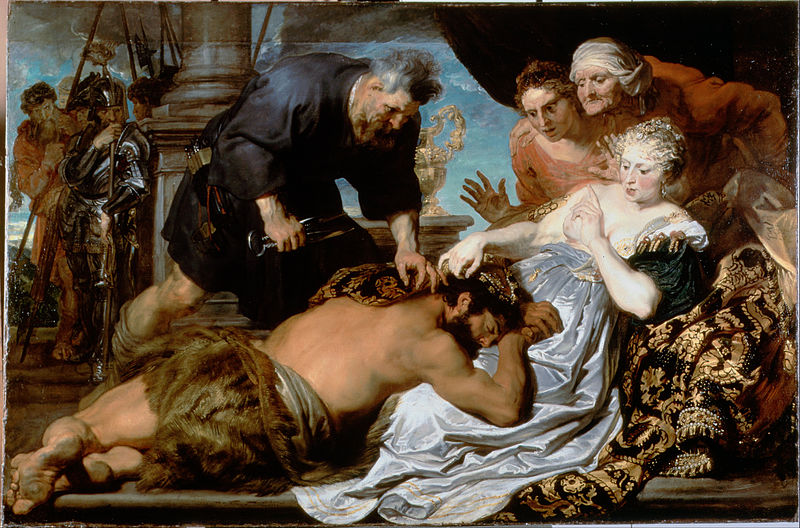[Greek] δαπανάω (dapanaō), [Latin] consummare: to spend, to pay, to expend, to consume, to waste, to exert effort; Mk.5:26, Lk.15:14, Acts 21:24, 2Cor.12:15, Jas.4:3

Samson and Delilah: painting by Anthony Van Dyck (1618)
Background information:
Samson and Delilah: The light within the painting is focused on Delilah, who is in contrast to Samson, covered with only a loincloth. Deliliah had spent time to figure out Samson’ powers. Delilah had put Samson to sleep. Delilah raises a silencing finger to hush the guards and command them into action. The guards watch with anxiety, knowing even their combined strength would be no match for the superhuman Sampson. The artist heightens the drama by giving the barber what appears to be giant sheep sheers. Samson loses his strength when his hair is removed.
Greek Hellenism: This term means to need more money, to defray expenses, to spend, to consume, to destroy, and to exhaust. Xenophon’s Cyropaedia 2.4.11 states “Accordingly, as I recognize this in advance, I think I need more money.” Andocides’ Against Acibiades 4.42 states “The expenditures required of me, I met, not from the monies belonging to the state, but from my own pocket.” Isaeus’ Dicaeogenes 5.43 states “It is the property of these men, Dicaeogenes, that you inherited and have wickedly squandered, and having converted it into money you now plead poverty.
Old Testament: While Samson stayed with her, the Phillistine leaders instructed Delilah to discover his great strength. Delilah spent her time in convincing Samson to reveal his great strength. Samson revealed that he was a Nazirite for which no razor has touched his hair. Samson revealed that fastening his seven dreadlocks would make him grow weaker. Deliliah put Samson to sleep and called for a man to cut his hair. Samson became immediately helpless but was finally given the strength to cause destruction to upend two middle columns, resulting his and others’ death.
New Testament: This term means to spend, to waste, and to exert effort. The hemorraghic woman had suffered greatly and spent all she had at the hands of the doctors. The prodigal son squandered everything he had and found himself in dire need. Paul, attempting to rehabilitate his reputation among the Jews, provided for the sacrifices of four Nazirites. Paul, not wanting to be a burden to his followers, would be gladly spent (invest) his time in serving others. It is the manner (or motivation) in which one deals with needs and desires that can determine good or bad.
Scripture:
“When hed had freely spent everything, a severe famine struck that country, and he found himself in dire need.” Lk.15:14
The prodigal son (in the Parable of the Lost Son) had squandered everything he had. His father eventually welcomed him back to the family.
“Take these mean and purify yourself with them, and pay their expenses that they may have their heads shaved. In this way everyone will know that there is nothing to the reports that have given about you but you live in observance of the law.” Acts 21:24
Paul himself was also a Nazarite. Paul was trying to make amends his repairing his reputation among the Jews. It was customary to provide a lamb, ram, and food and drinks for the Nazirite sacrifices.
“I will gladly spend and be utterly spent for your sakes. If I love you more, am I to be loved less?” 2Cor.12:15
Paul did not want to be a burden to his followers. He would gladly exert his efforts in serving others.
Conclusion:
Consume, consummation, consumed
In Greek Hellenism, it was interesting to discover the more nuanced meanings of this term: to defray expenses and to destroy (a person). In anytime period of history, people can squander their or other’s money.
Samson, a Nazirite, was known to obtain his strength from his dreadlocks.
Paul was also thought to be a Nazirite. 2Cor.12:15 illustrates a more recent notion of being spent (tired) in some activity. Pleasures, in themselves, are not evil. The motivations in for seeking needs and desires are what determine what is good or evil.
It was sheer luck that I was able to find several scriptural examples of both Nazirites and shears.
